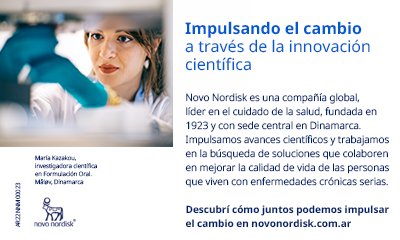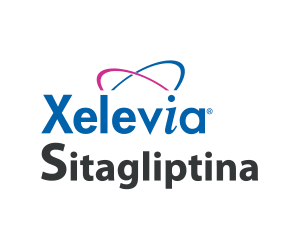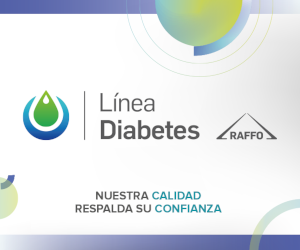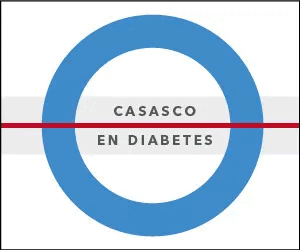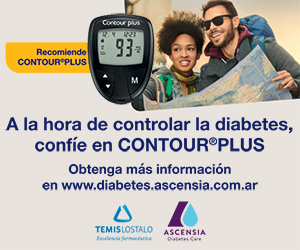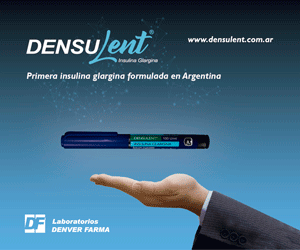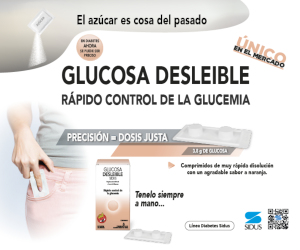Tratamiento en adultos con diabetes mellitus tipo 1: ¿qué variables impactan en el control glucémico?
DOI:
https://doi.org/10.47196/diab.v48i2.207Palabras clave:
diabetes tipo 1, adultos, tratamiento intensificado, control glucémicoResumen
Objetivos: analizar modalidades terapéuticas en personas con diabetes mellitus tipo 1 (DM1) y su relación con el control glucémico.
Métodos: estudio multicéntrico, observacional, transversal en personas con DM1 igual o mayor de 18 años. Realizado en 24 centros por médicos especialistas en Nutrición y/o Diabetes (01/10/2011 a 30/09/2012). Encuesta con datos clínicos, laboratorio y tratamiento habitual. Estadística: Chi2, correlación de Spearman, regresión logística múltiple.
Resultados: 514 pacientes, edad 40,6±14,6 años, sexo femenino 55,1%, antigüedad DM1 17,4±12,0 años, media A1C 8,0±1,5%, media glucemia de ayunas 147,2±69,1 mg/dl, frecuencia de automonitoreo 3,3±1,5 veces/día. El 38,8% presentó A1C<7%, mientras el 60,9% tenía A1C <8%. Insulinoterapia intensificada 75,1%; con bomba de infusión 8,6%, realizaba conteo de hidratos, 62,1%. La media de A1C fue 7,8±1,5% en el tratamiento intensificado y 8,4±1,7% en el
tratamiento convencional (p=0,001). Presentó hipoglucemias en la última semana el 67%, siendo mayor en el grupo intensificado (p=0,0001).
En regresión logística múltiple, el mejor control glucémico correlacionó con la realización de actividad física (p<0,002), conteo de hidratos (p<0,04), respetar horario de comidas
(p=0,0001) y mayor frecuencia de automonitoreo (p=0,004).
Conclusiones: El 38,8% presentó A1C< 7%. La insulinoterapia intensificada se asoció a mejores niveles de A1C y con mayor frecuencia de hipoglucemias. El mejor control correlacionó con
realización de actividad física, respetar el horario de comidas, el conteo de hidratos y mayor frecuencia de automonitoreo.
Citas
The Diabetes Control and Complications Trial Research Group: the effect of intensive treatment of long-term complications in insulin dependent diabetes mellitus. N. Engl. J Med. 1993;329: 977-986.
The DCCT Research Group: implementation of treatment protocols in the diabetes control and complications trial. Diabetes Care 1995; 18: 361-375.
The DCCT Research Group: adverse events and their association with treatment regimens in the diabetes control and complications trial. Diabetes Care 1995; 18: 1415-1427.
DCCT/EDIC Research Group. Epidemiology of Diabetes Interventions and Complications (EDIC). Design, implementation, and preliminary results of a longterm follow-up of the Diabetes Control and Complications Trial Cohort. Diabetes Care 1999; 22:99-111.
Nathan DM, Cleary PA, Backlund JY, Genuth SM, Lachin JM, Orchard TJ, et al. Diabetes Control and Complications Trial/ Epidemiology of Diabetes Interventions and Complications(DCCT/EDIC), Study Research Group. Intensive diabetes treatment and cardiovascular disease in patients with type 1 diabetes. N. Engl. J. Med. 2005; 353:2643-53.
Nathan DM; DCCT/EDIC Research Group. The diabetes control and complications trial/epidemiology of diabetes interventions and complications study at 30 years: overview. Diabetes Care 2014 Jan; 37(1):9-16.
Brownlee M. The pathobiology of piabetic complications. A unifying mechanism. Diabetes. 2005; 54:1615-1625.
Chan JCN, Gagliardino JJ, Baik SH, Jean- Marc Chantelot, Hancu N, Ilkova H, Ramachandran A, Aschner P. Multifaceted determinants for achieving glycemic control. The International Diabetes Management Practice Study (IDMPS). Diabetes Care 2009; 32:227-233.
Gerstl EM, Rabl W, Rosenbauer J, Grobe H, Hofer SE, Krause U,Holl RW, et al. Metabolic control as reflected by HbA1c in children, adolescents and young adults with type-1 diabetes mellitus: combined longitudinal analysis including 27,035 patients from 207 centers in Germany and Austria during the last decade. Eur. J. Pediatr. 2008,167:447-453.
Beck RW, Tamborlane WV, Bergenstal RM, et al. The T1D Exchange Clinic Registry. J. Clin. Endocrinol. Metab. December 2012, 97(12):4383-4389.
Kaufman FR, Halvorson M, Carpenter S. Association between diabetes control and visits to a multidisciplinary pediatric diabetes clinic. Pediatrics 1999, 03:948-951.
Davison KA, Negrato C, Cobas R, Matheus A, et al. Relationship between adherence to diet, glycemic control and cardiovascular risk factors in patients with type 1 diabetes: a nation wide survey in Brazil. Nutrition Journal. 2014, 13:19.
Simmons JH, Chen V, Miller K, et al. Differences in the management of type 1 diabetes among adults under excellent control compared with those under poor control in the T1D Exchange Clinic Registry. Diabetes Care 2013, 36:3573-3577.
Evans JM, Newton RW, Rota DA, Mac Donald TM, Stevenson RJ, Morris AD. Frequency of blood glucose monitoring in relation to glycemic control: observational study with diabetes database. BMJ 1999, 319: 83-86.
Chimen M, Kennedy A, Nirantharakumar K, Pang T T, Andrews R, et al. What are the health benefits of physical activity in type 1 diabetes mellitus? Diabetologia 2012; 55:542-551.
Galler A, Lindau M, Ernert A, Thalemann R, Raile K. Associations between media consumption habits, physical activity, socioeconomic status, and glycemic control in children, adolescents, and young adults with type 1 diabetes. Diabetes Care, 2011;34:2356-2359.
Tamborlane W, Bed R, Bode B et al. The Juvenile Diabetes Research Foundation Continuous Glucose Monitoring Study Group. Continuous glucose monitoring and intensive treatment of type 1 diabetes. N. Engl. J Med., 2008; 359: 1464-76.
Craig ME, Handelsman P, Donaghue KC and NSW/HbA1c Study Group. Predictors of glycemic control and hypoglycaemia in children and adolescents with type 1 from the NSW and ACT. Med. J. Aust. 2002; 177:235-238.
Polak J, Backlund J. Progression of carotid artery intima-media thickness during 12 years in the diabetes control and complications. Trial/Epidemiology of Diabetes Interventions and Complications (DCCT/EDIC). Diabetes Care 2011; 60:607-613.
Descargas
Publicado
Cómo citar
Número
Sección
Licencia

Esta obra está bajo una licencia internacional Creative Commons Atribución-NoComercial-SinDerivadas 4.0.
Dirección Nacional de Derecho de Autor, Exp. N° 5.333.129. Instituto Nacional de la Propiedad Industrial, Marca «Revista de la Sociedad Argentina de Diabetes - Asociación Civil» N° de concesión 2.605.405 y N° de disposición 1.404/13.
La Revista de la SAD está licenciada bajo Licencia Creative Commons Atribución – No Comercial – Sin Obra Derivada 4.0 Internacional.
Por otra parte, la Revista SAD permite que los autores mantengan los derechos de autor sin restricciones.


